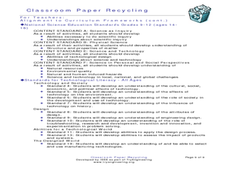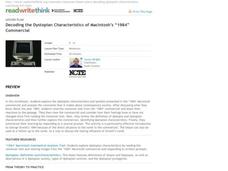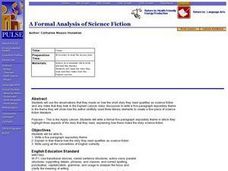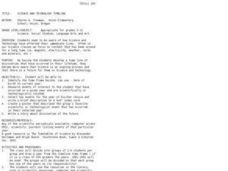Science 4 Inquiry
States and Phases of Matter
Plasma is the most common phase of matter in our universe. Scholars explore the change of energy as molecules change phases of matter. They rotate through stations, graphing the changes in energy level.
Core Knowledge Foundation
Astronomy Tell It Again!™ Read-Aloud Anthologys
A read-aloud anthology focuses on astronomy. Each week for three weeks, first graders are introduced to and listen to a text, answer comprehension questions, then complete extensions that include a learning activity and skills practice....
Core Knowledge Foundation
The History of the Earth Tell It Again!™ Read-Aloud Anthology
A read-aloud anthology focuses on Earth's history. Over three weeks, young scholars listen to and discuss stories about the layers of the Earth, minerals, fossils, different kinds of rocks, and dinosaurs. After the lesson's text, each...
Institute of Electrical and Electronics Engineers
Working with Watermills
In collaborative groups, emerging engineers or environmental scientists plan and construct a water wheel or watermill that rotates for a total of three minutes. Everything you need to carry out this instructional activity is included:...
National Wildlife Federation
Get Your Techno On
Desert regions are hotter for multiple reasons; the lack of vegetation causes the sun's heat to go straight into the surface and the lack of moisture means none of the heat is being transferred into evaporation. This concept, and other...
Science 4 Inquiry
Enzymes in Action
Enzymes play a role in almost every function in the human body. Scholars explore three variables related to the use of enzymes. They observe a catalase reaction, experiment with substrates, and examine reactions rates.
Science 4 Inquiry
Musical Vibes with Palm Pipes
Ancient people used musical pipes as early as the third millennium BCE. Young scientists explore the workings of musical pipes to better understand the relationship with frequency, length of pipe, and sound waves. They determine the...
Institute of Electrical and Electronics Engineers
Classroom Paper Recycling
After reading about the history and recycling of paper, creative crafters collaborate to think of a new process for making recycled paper. A complete teacher's guide and student worksheets are included. There is no written procedure for...
Institute of Electrical and Electronics Engineers
Ship the Chip
Here is a tasty challenge, especially for middle school engineers: design a container that meets mass and volume criteria, and will safely transport a tortilla or potato chip through the mail without damaging it! Mostly, this is a crisp...
Institute of Electrical and Electronics Engineers
Exploring at the Nanoscale
Nano-nano! Nanotechnology can seem like it's from another planet! After learning about this tiny technology, collaborative groups experiment with how smaller particles affect chemical reactions. They do this by immersing a whole and a...
Institute of Electrical and Electronics Engineers
Telescoping Periscope
Ahoy, matey! Here is an engineering expedition that mini mariners are sure to be swept away by! After reading a brief description and history of periscopes, they work in crews to construct one. Use this activity to enhance a lesson on...
Institute of Electrical and Electronics Engineers
Nano Waterproofing
This lesson plan will make an impact, especially on scientist-athletes who may have an interest in waterproof clothing! Acting as materials engineers, they work collaboratively on waterproofing pieces of cotton fabric. This challenge is...
Centers for Disease Control and Prevention
Teach Mrs. Jones' Class about Microbes
During a biology lesson, scholars research microbes, design a lesson plan using an outline, and present the lesson to the class.
Columbus City Schools
ABC: Acid Base Chemistry
Bubble, bubble, boil and trouble! What causes common substances like baking soda and vinegar to react the way they do? Welcome your junior chemists to the wonders of acid-base chemistry using a comprehensive and fun resource. Engage them...
Towson University
Looking Into Lactase: Guided Inquiry
Milk does a body good ... unless, of course, someone is lactose intolerant. Pupils play the role of pharmaceutical scientists in a guided inquiry lab about lactase. Lab groups collaborate to learn more about lactose intolerance, how...
California Academy of Science
Optimal and Sustainable: Renewable Energy Revamp
More than 100 cities around the world have shifted from fossil fuels to renewable energy sources. Scholars investigate a city wanting to make this switch, but needs help determining how to make the shift. Groups consider all options,...
California Academy of Science
Building Better Buses: Transportation Design Challenges
Scholars learn about a series of three challenges when they design a bus system for a small town. They determine the bus routes and then figure out the best type of fuel to use before considering the cost of going electric. Learners...
ReadWriteThink
Decoding the Dystopian Characteristics of Macintosh’s “1984” Commercial
Known as one of the most iconic advertisements of the 20th century, Macintosh's "1984" commercial has become more of a social statement. Present the ad to a new audience of viewers with a lesson focused on identifying dystopian...
Core Knowledge Foundation
First Grade Skills Unit 4
Twenty-eight lessons make a unit that focuses on skills practice. Lessons explore r-controlled vowels, past tense verbs, nouns, adjectives, and two-syllable words. Pupils read a story, answer questions, and draft a descriptive essay...
Core Knowledge Foundation
Ecology Tell It Again!™ Read-Aloud Anthology
A read-aloud anthology provides informational texts about ecology to boost reading comprehension. Third-graders listen and discuss readings where they answer questions and focus on vocabulary. Pupils complete extension activities,...
Curated OER
A Formal Analysis of Science Fiction
Students write a five paragraph expository theme. They explain in their theme how the story they read qualifies as science fiction. Students write using all the conventions of English correctly.
Curated OER
Focus on Food Chains
Third graders collect and analyze data about food chains. They conduct Internet research about the habitat of a selected organism, write a narrative, and create a computer slideshow using Kid Pix computer software that illustrates the...
Curated OER
Science and Technology Timeline
Students develop a time line of discoveries that have occurred in their lifetime. In this time line lesson plan, students research scientifically or technologically related events of interest to them, write a brief description on a 4x6"...
Curated OER
Space Science
Eighth graders study the objects in our solar system. In this space lesson students identify and describe planets, then classify them as terrestrial or gaseous.
Other popular searches
- Science Focus 8
- Science Focus 4
- Science Focus 7.
- Science Focus 3
- Science Focus 8 Crosswords
- Science Focus Living Things
- Science Focus 9
- Science Focus 8 Mixtures
- Science Focus 7
- Science Focus Review Notes
- Science Focus 8 Worksheets
- Science Focus 10























